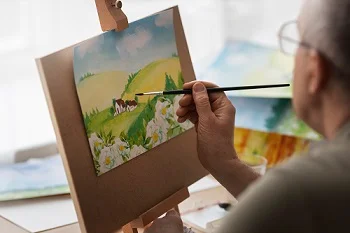What Is Dementia?
Dementia is a term used to describe a group of symptoms affecting memory, thinking and social abilities severely enough to interfere with your daily life. It isn’t a specific disease, but several diseases can cause dementia. Though dementia generally involves memory loss, memory loss has different causes. Having trouble remembering familiar names and familiar faces is a sign of Dementia. If you find your parents or loved ones struggling with names, do get a free screening done. Dementia is a general term for loss of memory, language, problem-solving and other thinking abilities that are severe enough to interfere with daily life. In the past, dementia was sometimes referred to as “senility” and was thought to be a normal part of aging, likely because it is more common as people age. As many as half of all people age 85 or older may have dementia. But dementia is not a normal part of aging. Not everyone develops dementia as they get older, and, in rare cases, some people develop dementia in midlife.
Different types of dementia can affect people differently, and everyone will experience symptoms in their own way. However, there are some common early symptoms that may appear some time before a diagnosis of dementia.
These include:
- memory loss
- difficulty concentrating
- finding it hard to carry out familiar daily tasks, such as getting confused over the correct change when shopping
- struggling to follow a conversation or find the right word
- being confused about time and place
- mood changes
Activities
Having dementia doesn’t mean you have to stop doing the things you enjoy. There are all sorts of activities you can do – physical, mental, social and creative – that help you to live well with dementia and improve wellbeing. If you care for someone who has dementia, a shared activity can make both of you happier and able to enjoy quality time together. You can continue with the activities you already enjoy, though they may take longer than they used to, or try new activities.
Stay Socially Active: Keeping in touch with people is good for your confidence and mental wellbeing, like meeting up with friends and family.
You could try activities like:
- dance, tai chi, yoga, swimming or joining a walking group to help keep you active and sociable – look out for local dementia-friendly swimming, gym and walking sessions
- arts-based activities – drawing/painting classes, drama groups and book clubs can all help you stay involved
- reminiscence work – share your life experiences and stories from the past with photos, objects, video and music clips, either as a book or on a tablet or other digital device
- find a local memory café (also known as a dementia café), on the Alzheimer’s Society website – meet other people with dementia and their carers in an informal drop-in setting to share advice, tips and support
- singing for the Brain groups run by the Alzheimer’s Society – singing is known to improve mood and wellbeing and is also great fun.
Smartphones: These digital devices can be very useful for people with dementia. From online games, puzzles and dedicated dementia apps, to Zoom and YouTube, they provide a way to stay engaged with others and enjoy a range of activities. Many communities are working to become dementia-friendly, such as Avisya Elder Care. This means that organisations and venues may have specialist events and activities for people with dementia, such as:
- dementia-friendly cinema screenings and streaming of live theatre productions
- sensory gardens – a garden or plot designed to provide different sensory experiences, including scented plants, sculptures, textured touch pads and water features
- woodland walks
If you’d like to venture further from home, there are organisations that can support both you and the person caring for you.. Dementia Adventure offers breaks in the India designed for people living with dementia and their family or carers
Activities for the later stages of dementia: It’s often assumed that people in the later stages of dementia are unable to engage in activities, but this isn’t true. Activities will often need to be simplified and are more likely to focus on the senses, such as:
- sight
- hearing
- touch
- taste
- smell
Playing music, having objects to touch and interact with, and hand massage can all help people with dementia in the later stages. Playlist for Life is a music and dementia charity. It promotes how music with personal meaning can help people with dementia. You can find and listen to existing playlists, or make your own. Active Minds researches and develops a range of activities for people affected by dementia.
-W.H.O-
Plan:
Dementia Care @ $850
